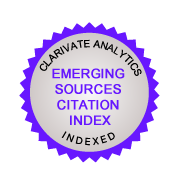Awakening reflection in teacher training: effective devices
DOI:
https://doi.org/10.24310/innoeduca.2018.v4i1.3610Keywords:
critical incidents, reflection, training teachersAbstract
There were two objectives stated in this research carried out at the Law Faculty at Buenos Aires University:
1) Relieve and systematize the critical incidents posed by the students who study to became teachers in Legal Sciences in order to generate knowledge about the contents of the reflections that are produced from it.
2) Propose strategies for analyzing critical incidents that contribute to the development of reflective processes of the students of the teaching staff, in correspondence with the international theoretical advances in this sense.
The methodology used is qualitative, focused on the analysis of reflections of future teachers about their practices through work devices within a teacher training program.
In this study, 30 critical incidents that constitute the units of analysis were analyzed. The material collected belongs to the lawyers who studied Teaching Residence during 2011 and 2013 in the Law Faculty at Buenos Aires University.
Downloads
Metrics
Publication Facts
Reviewer profiles N/A
Author statements
Indexed in
-
—
- Academic society
- N/A
- Publisher
- Universidad de Málaga
References
Anijovich, R. et al (2007). Formar docentes reflexivos. Una experiencia en la facultad de Derecho de la UBA. Revista Academia. Nro. 9. Facultad de Derecho. Universidad de Buenos Aires. pp. 235-249.
Anijovich, R. et al (2009). Transitar la formación pedagógica. Buenos Aires, Argentina: Paidós.
Anijovich, R y Cappelletti, G (comp). La práctica como eje de la formación. Buenos Aires. Eudeba.
Argyris, C. Y Schön, D. (1974): Theory in practice: Increasing professional effectiveness. San Francisco, Estados Unidos: Jossey Bass.
Camilloni, A. (2010). La formación de profesionales universitarios. Buenos Aires. Revista Electrónica de la Universidad Nacional de La Matanza.
Cols, E. (2011). Estilos de enseñanza. Rosario, Argentina: Homo Sapiens.
Dewey, J. (1989). Cómo pensamos. España: Paidós.
Doyle (1998). Trabajo académico. Didáctica II N 2. Aportes teóricos. Universidad de Buenos Aires. Facultad de Filosofía y Letras.
Fernández González, J., Elórtegui Escartín, N. y Medina Pérez, M. (2003). Los incidentes críticos en la formación y perfeccionamiento del profesorado de secundaria de ciencias naturales. Revista Interuniversitaria de Formación de Profesorado. vol. 17, número 001, pp:101-112. Universidad de Zaragoza España. ISBN 0213-8646.
Fernández González, J., Medina Pérez, M. y Elórtegui Escartín, N. (2003). Enseñar a profesores de secundaria con situaciones problemáticas. Revista electrónica de Enseñanza de las Ciencias, Vol. 2, Nº 3, pp. 263-270.
Flanagan, B. (1954). The Critical Incident Technique. Psychological Bulletin, vol. 54, no. 4. Recuperado de http://www.apa.org/pubs/databases/psycinfo/cit-article.pdf
Griffin, M.L. (2003). Using Critical Incidents to Promote and Assess Reflective Thinking in Preservice Teachers. Reflective Practice, 2003, Vol.4, Nº2.
Husu, J., Toom, A., Patrikainen, S. (Febrero 2008). Guided reflection as a mean to demonstrate and develop student teachers reflective competencies. Reflective Practice. Vol. 9, No. 1. University of Helsinki, Finland. pp. 37–51.
Harrison J. y Lee R. (2011). Exploring the use of critical incident analysis and the professional learning conversation in an initial teacher education programes. UK University of Leicester.
Litwin, E. (2008) El Oficio de enseñar, Condiciones y contextos. Buenos Aires, Argentina: Paidós.
Perrenoud, P. (2004) Desarrollar la práctica reflexiva en el oficio de enseñar., Barcelona, España: Grao.
Rosales, C. (2000). Evaluar es reflexionar sobre la enseñanza. Madrid, España: Narcea.
Schön, D. (1997) La formación de profesionales reflexivos, Barcelona, España: Paidós M.E.C.
Shulman, J. H. (Abril 2002): Happy Accidents: Cases as opportunities for Teacher Learning. San Francisco, West Ed. Recuperado de https://www.wested.org/online_pubs/happyaccidents.pdf
Tripp, D. (1993). Critical Incidents in Teaching: Developing Professional Judgement. London, Reino Unido: Routledge.
Downloads
Published
How to Cite
Issue
Section
License
All contents published by Innoeduca. International Journal of Technology and Educational Innovation are subject to Creative Commons Attribution-Nocomercial-NoDerivatives 4.0 International License, whose complete text can be consulted at https://creativecommons.org/licenses/by-nc-nd/4.0/legalcode. Thus, copying, distribution, public communication, derivative works and commercial use of content are permitted as of the aforementioned issue provided that the source and the author of the text are cited.
It is the responsibility of the authors to obtain the necessary permits for images that are subject to copyright.

This work is licensed under a Creative Commons Attribution-NonCommercial-NoDerivatives 4.0 International License.












242.png)








